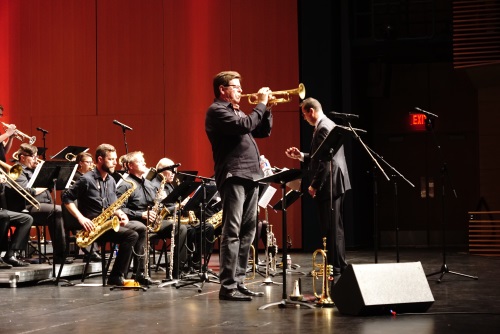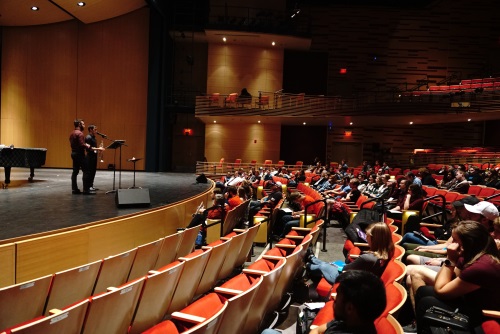Midwest Trumpet Festival
The 2018 Midwest Trumpet Festival, held at Pittsburg State University in Pittsburg, Kansas, is celebrating its tenth year of bringing together professional trumpet pedagogues and performers in the Midwest region.
The festival's mission is to gather leading performers, educators, students, and community for an intensive time of large and small continuing education sessions, master classes, recitals, and concerts. Dr. Todd J. Hastings is the director of the event, which each year features distinguished trumpet performers and scholars. The featured guest artists this year included Julian Kaplan and Wayne Bergeron.
Julian Kaplan is a well-established performer from Cleveland, Ohio. He attended the University of Kentucky and currently serves as the principal trumpet in the Kansas City Symphony.
Wayne Bergeron, a native-born Californian, is considered one of the most sought-after musicians in the world, having performed for over 400 TV and motion picture soundtracks. His well-known movie recordings include The Incredibles 2, La La Land, Rocky Balboa, and many more. Throughout his extensive career, Bergeron served as lead trumpet in Maynard Ferguson’s band, principal trumpet at the Pantages Theatre for over 15 years, and is regularly featured with the Hollywood Bowl Orchestra.
The festival began with opening remarks by Wayne Bergeron. In the presentation, titled Reflections on a Life in the Studio, Bergeron spoke about his background as a beginner player and his work towards becoming a professional. Through his career, he shared that it is important to be a diverse player, capable of playing multiple styles. He found that knowing your role in every ensemble, including how to blend, is what makes a great musician, as well as always being prepared for the job.
After the opening remarks, there were two jazz-related seminars. The Beginning Jazz Improvisation class was comprised of first time improvisers. Dr. Tom Smith from Florida Southwestern State College led the session. Dr. Smith used a simple rhythmic approach, set to a chord track so students could hear everything fit together and experiment what works for them.
The alternative seminar, Jazz Trumpet Lineage, was directed by Mr. Al Hood from the University of Denver and Dr. David Cooper from the University of Wisconsin-Platteville. This class introduced the most influential jazz trumpeters, highlighting how each has impacted the jazz world. Beginning with Buddy Bolden as the “Pop” from New Orleans, they continued on to Louis Armstrong, Bix Beiderbecke, Roy Eldridge, Harry Sweets Edison, Dizzie Gillespie, Clark Terry, Miles Davis, Clifford Brown, Kenny Wheeler, Lee Morgan, and Freddie Hubbard, to name a few. The discussion featured brief recordings of important works. More modern players were introduced by Dr. Cooper, and included Alex Sipiagin, Jonathan Finlayson, Ingrid Jensen, Avashai Cohen, Russ Johnson, Ambrose Akinmusire, Jason Palmer, and Scott Tinkler.
After the conclusion of the trumpet lineage seminar, Wayne Bergeron gave a lecture on Range Development. The discussion began with the disclaimer that there is no real right way to attain range due to our individual physical attributes; however, the best thing would be to experiment to find what works for one’s self. Bergeron discussed that while most musicians tend to overblow, how much you blow is not as important as how efficiently you are using your air. He also stressed the importance of a steady airstream when building range. The body’s muscles will automatically react to the resistance as your range increases so there is no need to strain or add extra effort. Bergeron gave a formula in which you create more compression with the more air you add to the horn, which then leads to faster lip vibrations; altogether with an opened aperture this practice results in an increased range. He also noted how jaw positioning comes in to play with range; slightly pushing one’s jaw out when ascending may help some trumpet players (sometimes the opposite approach works, as well). Overall, the largest thing Bergeron emphasized throughout the lecture was that the foundation must be established first.
The first day closed with an evening concert performed by the Crossroads Jazz Orchestra directed by Todd Hastings, featuring guest artist Wayne Bergeron and Festival Faculty. The performance included solos by trumpeters David Cooper, Freddie Green, Al Hood, and Tom Smith, and included a variety of songs, most notably High Clouds and a Good Chance of Wayne Tonight, You Go to My Head, Orange Colored Sky, and the classic Gordon Goodwin tune, Maynard and Waynard.

Wayne Bergeron performs with the Crossroads Jazz Orchestra (Photo credit: Iskander Akhmadullin)
The second day of the festival began with a group warm-up session for junior/senior high students as well as a group warm-up session for college/professional students. The junior/senior high warm-ups were led by Mr. Freddie Green from Missouri Southern State University. The session was organized to present the best ways to warm-up before practice each day. The students were given packets and were instructed through lip slurs, articulation exercises, flow studies, pitch bending, technique studies, and an exercise for expanding scales. This session was ideal for students as they found that focusing on fundamentals helps make playing and reading easier.
The college/professional warm-ups were led by Dr. David Cooper. He provided a handout that organized the session into four areas on which to focus, giving attention to breaking down each task into smaller, manageable/achievable tasks. The first topic was stretching which consisted of long tones. He subsequently moved on to strength which consisted of lip slurs, Arban exercises, and interval studies. Next, Dr. Cooper taught how to work on technique, describing it as “road work” that equaled agility, nuance, and speed. These techniques were practiced through scales, articulation, and multiple tonguing. Finally, the session covered musicality through transposition, sight reading, ornamentation, and memorization.
Following the warm-up sessions was a group trumpet ensemble reading session for college/professional musicians as well as a separate master class for junior/senior high students. The college/professional reading session was directed by Dr. Eric Dickson from Truman State University, who masterfully led the class in sight-reading several trumpet ensemble pieces.
The clinicians for the high school trumpet master class were Dr. Iskander Akhmadullin, Dr. David Hunsicker, Dr. Grant Peters, and Dr. William Richardson. Student performers from Kansas and Missouri included Alejandra Cornelio, Johnathan Gauthier, Robert Offutt, and Caleb Witte.
Immediately following the sessions was a Question and Answer Session with Wayne Bergeron, moderated by Mr. Bob Harvey and Mr. Ben Hay. Bergeron explained that a normal day for a freelance musician like him puts him in a position where he is either performing theater shows or on-call for a recording session. He was asked to give advice to young minds who think they cannot do what he does. He replied that it cannot be forced and that one must keep modifying on a constant quest for improvement. He advised trumpeters to experiment and ask questions. Bergeron proceeded to delve into the process of sight reading. He has sight-read from a young age and advised to constantly stimulate that part of the brain in order to improve.
Julian Kaplan followed with a master class featuring student performers Henry Zimmerman, Jackson Washburn, Brandon Sklute, Jacob Batey, and Brandon Sconce. Emphasizing simplicity of playing and focusing on producing a sound effortlessly, Kaplan took time with each student to work on fundamentals and gave advice performing their music.

Julian Kaplan works with trumpeter Brandon Sconce (Photo credit: Iskander Akhmadullin)
The last two sessions of the day were a group trumpet ensemble reading session for junior/senior high students and a presentation by Kaplan on Life in the Orchestra and How to Keep a Job. Kaplan detailed the orchestra audition process, comparing it to a job interview. He stated that intent and taking a risk is what sets one apart in auditions. Outside of playing in an orchestra, he emphasized that it is important to be a colleague, learn what you can, and to always maintain open communication. Other than playing and musicianship, relationships are a vital aspect to performing in a professional ensemble. Finally, Kaplan claimed that the best way to internalize music is to constantly listen, not just to learn the piece of music, but to learn the emotion.
The College Student Spotlight Recital was kicked off after Kaplan’s presentation by trumpet ensembles from Northwest Missouri State University, Southwest Baptist University, Wichita State University, Northeastern State University, Truman State University, and Pittsburg State University. Solo performers Jacob Batey, Seth Marshall, and Henry Zimmerman were accompanied by outstanding pianist Natalia Bolshakova.
The finale of the festival was a Faculty Artists Recital with featured guest artists Julian Kaplan and Wayne Bergeron, accompanied by Natalia Bolshakova. The performance featured MTF faculty Freddie Green, Tom Smith, Todd Hastings, David Cooper, Ben Hay, Tim Wootton, Grant Peters, Bob Harvey, Steve Molloy, William Richardson, Iskandar Akhmadullin, Eric Dickson, and David Hunsicker. Julian Kaplan played the Trumpet Concerto in E flat major by Haydn, Elegi by Rolf Wallin, and Sometimes I Feel Like a Motherless Child arranged by Donald Hunsberger. The final song of the night was Misty by Erroll Garner, conducted by Andrew Chybowski, featuring Wayne Bergeron and the Festival Faculty Ensemble. The crowd gave a standing ovation at the conclusion of the concert and filtered to the main lobby to await the chance to meet the performers.
(Source: Kimberly Shriver, Northwest Missouri State University trumpet student)
